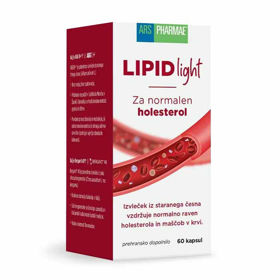Vprašanje stranke:
Kaj je LDL holesterol? Vprašanje anonimne stranke
Odgovor farmacevta:
LDL holesterol, kar pomeni lipoprotein nizke gostote, je vrsta lipoproteina, ki ga najdemo v krvni plazmi in igra ključno vlogo pri prenosu holesterola po telesu. LDL holesterol je pogosto znan kot "slabi" holesterol, ker lahko visoke ravni LDL holesterola v krvi povečajo tveganje za srčno-žilne bolezni.
Njegova vloga je prenašati holesterol iz jeter, kjer se proizvaja, in ga dostaviti v tkiva po telesu, kjer se uporablja za gradnjo celičnih membran, sintezo hormonov in druge vitalne funkcije. Vendar pa lahko prekomerna količina LDL holesterola v krvi povzroči težave, saj se lahko kopiči na stenah arterij in tvori aterosklerotične plake, kar lahko poveča tveganje za srčni infarkt, možgansko kap in druge srčno-žilne bolezni.
Ravni LDL holesterola v krvi so lahko posledica različnih dejavnikov, vključno z genetiko, prehrano, telesno dejavnostjo, telesno težo, kajenjem in drugimi dejavniki tveganja za srčno-žilne bolezni. Visoke ravni LDL holesterola so ena izmed glavnih komponent presnovnega sindroma, ki ga pogosto spremljajo debelost, visok krvni tlak, visoke ravni krvnega sladkorja in druge motnje presnove.
Diagnostični testi, kot je krvni test lipidov, se uporabljajo za merjenje ravni LDL holesterola v krvi. Pogosto se uporablja Friedewaldova enačba za izračun LDL holesterola, ki temelji na vrednostih skupnega holesterola, HDL holesterola in trigliceridov v krvi.
Kot del celostnega ocenjevanja tveganja za srčno-žilne bolezni se uporabljajo ciljne vrednosti LDL holesterola. Splošno sprejeta ciljna vrednost za LDL holesterol je manj kot 100 mg/dL, čeprav lahko za nekatere posameznike s povišanim tveganjem za srčno-žilne bolezni zdravnik priporoči še nižje ciljne vrednosti, na primer manj kot 70 mg/dL.
Zdravljenje visokih ravni LDL holesterola vključuje tako spremembe življenjskega sloga kot tudi jemanje zdravil. Spremembe življenjskega sloga, kot so zdrava prehrana, telesna dejavnost, opustitev kajenja in zmanjšanje telesne teže, lahko pomagajo zmanjšati raven LDL holesterola. Zdravila, kot so statini, fibrati, zaviralci absorpcije holesterola in druge vrste zdravil, se lahko predpišejo za zniževanje LDL holesterola pri ljudeh z visokim tveganjem za srčno-žilne bolezni.
Poleg tega se lahko uporabljajo tudi ciljno usmerjene terapije, kot so inhibitorji PCSK9, za ljudi z dednimi motnjami presnove, ki povzročajo zelo visoke ravni LDL holesterola, kljub zdravljenju z zdravili. Pomembno je omeniti, da ravni LDL holesterola niso edini dejavnik tveganja za srčno-žilne bolezni in da je pomembno oceniti tveganje na podlagi več dejavnikov, vključno s starostjo, spolom, kajenjem, krvnim tlakom, diabetesom, družinsko anamnezo srčnih bolezni in drugimi dejavniki tveganja.
Zanimivo branje: Holesterol vrednosti
Zanimivo branje: Zdravila za holesterol








 Facebook
Facebook
 Instagram
Instagram
 info@moja-lekarna.com
info@moja-lekarna.com

